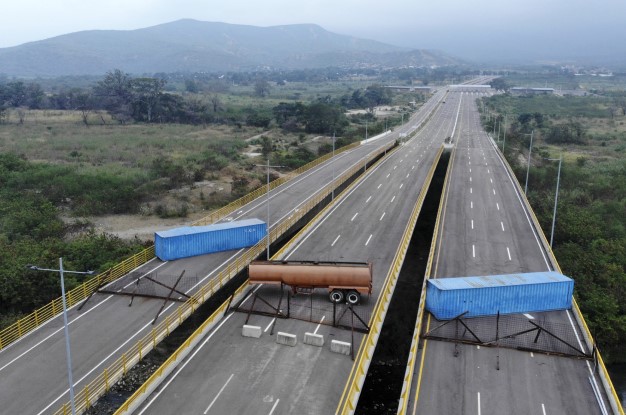The world watches in disbelief as photos show tractor trailers closing highways to block the passage of food, medicine and essentials into Venezuela. The opposition’s call for international aid may be strategic, to force the hand of Nicolas Maduro’s military: It can stand by a dictator, or stand down and let food and medicine through to people who need them.
The showdown is the latest chapter in a saga of suffering driven by Maduro’s economic policies and his subsequent refusal of international aid, which he characterizes as a manifestation of foreign intervention. But that doesn’t mean the international community has been completely powerless.
“We haven’t just been sitting there watching people die,” Jesús Aguais, a New York-based Venezuelan human rights activist, told AQ. Aguais is the executive director of AID FOR AIDS International (AFA), a nonprofit organization that provides free antiretroviral treatment to people with HIV and to at-risk communities in the developing world. For years, Aguais’ group has – largely quietly – strategically coordinated the delivery of HIV and malaria medication – and lately also baby formula – into Venezuela.
“There is an underground network that understands not only what the needs are but also how to get medications to those who need them,” Aguais told AQ.
Aguais represents the many Venezuelans abroad and in the country that have figured out ways to help people despite the seemingly impossible limitations. Others include Feliciano Reyna, a veteran HIV/AIDS activist, and Susana Rafalli, an advisor to Caritas International in Venezuela, where they are leading the efforts against malnutrition.
“International humanitarian aid has been entering the country as ‘international cooperation’, at least in the last two years,” Dr. Leopoldo Villegas, an international health advisor, told AQ. “Organizations from the UN system have been doing this work while in collaboration with other local organizations.”
In fact, the UN has been critical to AFA’s ability to get HIV drugs to people on treatment. AFA secures donations from pharmaceutical companies, who ship the drugs to a United Nations Humanitarian Response depot in Panama, which then gets shipped to Venezuela as part of a UN development cooperation agreement. Once there, an association of people living with HIV takes care of the distribution through a non-official, organized network. By connecting international actors with on-the ground networks, in 2018 AFA says it was able to provide medication for 45 percent of the Venezuelans with HIV tracked by the National AIDS program.
For shipments of malaria medicine, the nonprofit hires private door-to-door companies – the same used by Venezuelans with access to dollars to get unavailable products into the country. Aguais told AQ that the pervasive corruption that has helped dismantle Venezuela’s economy has in turn weakened the government’s ability – or willingness – to monitor shipments. For a fee, willing shipping companies can get you anything, and humanitarian aid has been following the same path as whisky and luxury items imported by elites.
“Leave it to the power of corruption developed by the Venezuelan government,” he told AQ.
Once the drugs are in the country, a patchwork of civil society actors works to connect them with people who need them. Venezuelans have for years had to use social media networks like WhatsApp to locate essential goods. But the grassroots organization goes beyond that, and includes civil society groups of doctors, academics as well as the Venezuelan Network of People Living with HIV, which also monitors the treatment of individuals who receive medication through AFA.
“This is a country that had institutions and networks before the crisis that can still be tapped into,” Guillermo Zubillaga, director of the Venezuela Working Group at Americas Society/Council of the Americas, told AQ. “There is already proven expertise in local partners.”
In addition to HIV medicine shortages and a resurgence of malaria, Venezuela is “facing ongoing epidemics of hepatitis A, tuberculosis, whooping cough, measles, and diphtheria, not to mention the malnutrition and shortages for chronic disease medication,” said Villegas.
After several years working behind the scenes, Aguais is speaking up because he doesn’t want the momentum for political change to sidetrack existing efforts to connect Venezuelans with medication.
“My message is don’t wait until Maduro is out,” Aguais told AQ. “Guaido’s team is on the right track. They have to do this, but we need to inform donors not to give up, and to tell the people that recent developments don’t mean you’re going to get your medicine tomorrow. The regime would rather let more people die.”
—
O’Boyle is a senior editor at AQ. Follow him on Twitter @BrenOBoyle









